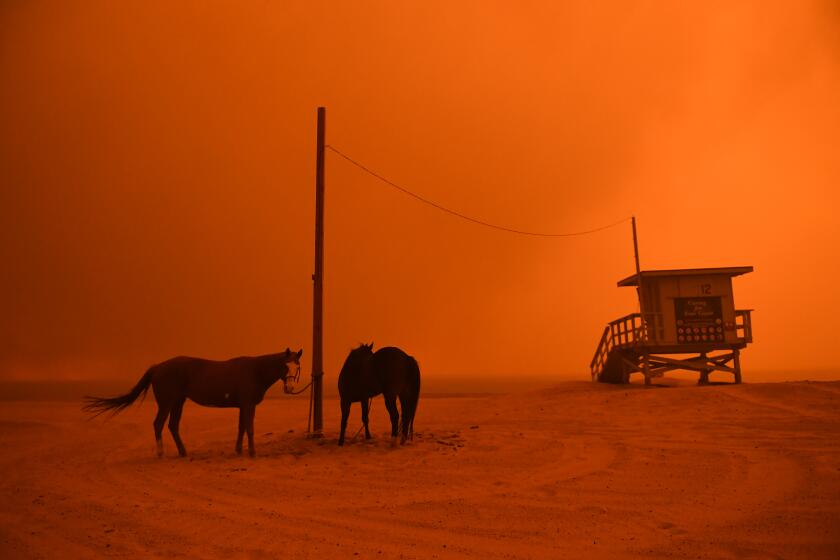Why an acclaimed L.A. mystery writer turned to vampire bikers in the desert
- Share via
On the Shelf
Rovers
By Richard Lange
Mullholland: 304 pages, $28
If you buy books linked on our site, The Times may earn a commission from Bookshop.org, whose fees support independent bookstores.
There are two kinds of people in the world: those who think vampire bikers tearing across the American Southwest in 1976 sounds like a great story, and the rest of you.
In “Rovers,” the path of that bloodthirsty gang crosses with a pair of undead brothers who evoke “Of Mice and Men” outside of Las Vegas. Richard Lange, who started out writing potent short fiction in the mode of Denis Johnson before pivoting to award-winning crime novels and now gothic horror, hopes you’re along for the ride.
“Maybe it’ll confuse some of the fans of my earlier books, but could also get me more readers from these other genres,” Lange said.
The word “genre” is controversial in bookland. For a long time, literary types used it to push certain works — mysteries, thrillers, science fiction, fantasy, romance — outside the mainstream. Some authors fought against being marginalized in bookstores and pigeonholed in the cultural conversation. At the same time, these works often sold better than literary fiction. And while many people who write and read books think these genre divisions are outmoded, they still serve a purpose. Commercially, this makes it easier for readers to find what they like; artistically, there are conventions and expectations, rules to follow — or disobey.
So where does “Rovers” belong — a book with rival gangs of killer vampires holing up in cheap motels and burying bodies in the desert, pursued by a victim’s father? “I wouldn’t call it a horror book, but I don’t call my crime books crime books either,” Lange said. “I just think it’s a revenge thriller — you know, with vampires.”
Lydia Millet, whose latest novel, “A Children’s Bible,” tackled climate change, reads new fiction on climate and argues against calling it a genre.
“Rovers” alternates among several points of view, living and undead: Jesse, the handsome vampire, and Edgar, his hulking, intellectually challenged brother; the Fiends, a group of eight bikers who revel in mayhem; and Charles, the despairing human father living out of his van trying to find out who killed his son. He has no idea what he’s in for.
Charles’ sections are written to his wife, in a nod to the epistolary form of Bram Stoker’s “Dracula.” Beyond that, however, Lange didn’t immerse himself in vampire stories, so his Rovers aren’t burdened with mythologies created by other novels. Instead of sharp teeth, they use sharp knives. “I was going to write the whole thing and not use the word ‘vampire’ in the book,” Lange said. “That proved to be impossible, if you have two people talking about people who drink blood and can’t go out in the daytime.”
When we spoke in July via Zoom, it was Lange’s first use of the platform, which he’d somehow managed to avoid during the pandemic. He forgot to turn on his ring light until halfway through, and as a tall guy with a big beard, he might have seemed a little intimidating if he weren’t so chatty. He pointed to the couch where he writes old-school style, with a pencil on legal pads.
He was in his office at home on a street dividing Silver Lake and Echo Park, where he lives with his wife and their dog Judge Judy. They’ve been there for two decades, going back to when he worked in L.A.’s small publishing scene, with a long stint as an editor at a now-defunct music magazine. Lange started writing short stories — so long ago he used to send them out in manila envelopes — because it was as much as he could handle on nights and weekends while working full time.
“Palm Springs Noir,” the latest story collection in Akashic Books’ “Noir” series, unleashes darkness, desert camp and ample blood in the pool water.
Lange has set his fiction in bars, cheap hotels and gambling halls because he likes bars and gambling and, when money was tight, second-rate hotels in the desert were his version of a Hawaiian vacation. “Rovers” moves across gritty vistas of a vintage Southwest, from nowheresville to Phoenix to Las Vegas. The American Bicentennial celebrations add a dose of irony. What is a bicentennial to the undead? Child’s play.
The book has a lot going on, with as many settings as characters, propelled by the jet fuel of resentments, assassinations-for-hire, mistakes and love affairs. Lange balances it all perfectly.
There are a few amazing fights too. “I like to write action scenes because they’re easier than writing emotional scenes,” Lange admitted. “I mean, I had to draw charts, and it’s almost like choreographing it for a movie. I’d studied Kung Fu and boxing, so I kind of know about martial arts. I can write punching, and this one had a lot of knife fighting. So you’ve got to find a billion different ways to describe stabbing. It can be a little bit of a challenge, but it’s something I enjoy doing. They’re not easy to write well and to keep a reader interested. ‘Cause you have to give it a story.”
Lange’s awareness of the needs of a reader are double-edged. He’s delivered a swift, delicious novel that’s firing on all cylinders. But it’s not what his readers expect.
“I worked 9 to 5 for 20 years and played by the rules,” he said. “When I became a writer, I thought, ‘Now I’m free. I can do whatever I want.’ That’s what I thought being a writer meant. Then you realize there are certain rules you are expected to play by. One of them is to find something you do well and do it over and over, keep it going, what people like. And I keep screwing it up.”
Stephen Graham Jones on how he put together ‘The Only Good Indians,’ a Ray Bradbury Prize finalist, and why horror is the most fascinating genre.
Kellogg is a former books editor of the L.A. Times. She can be found online @paperhaus.
More to Read
Sign up for our Book Club newsletter
Get the latest news, events and more from the Los Angeles Times Book Club, and help us get L.A. reading and talking.
You may occasionally receive promotional content from the Los Angeles Times.








